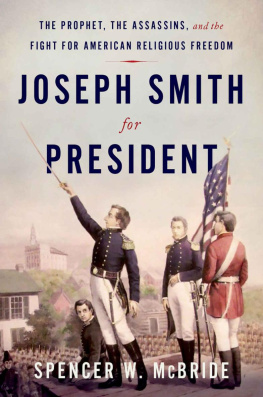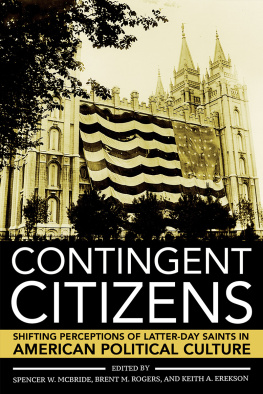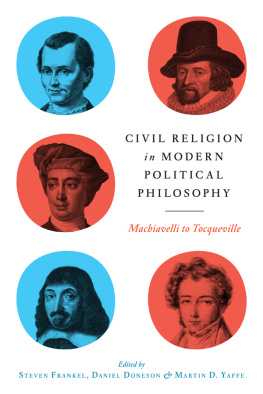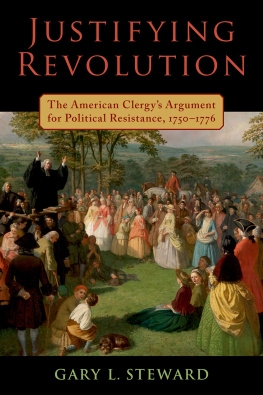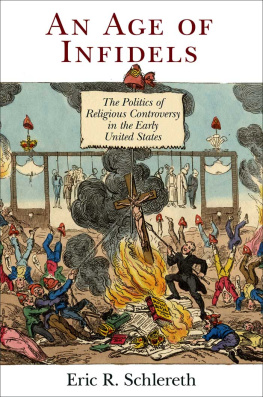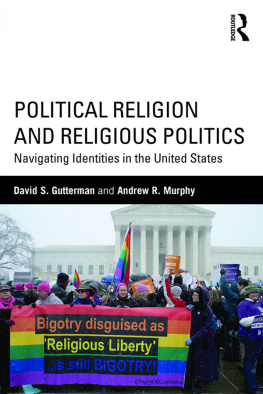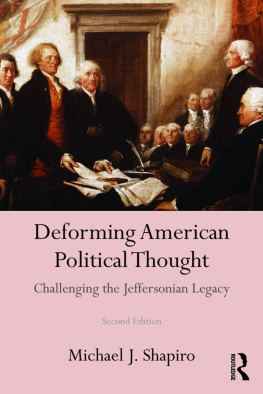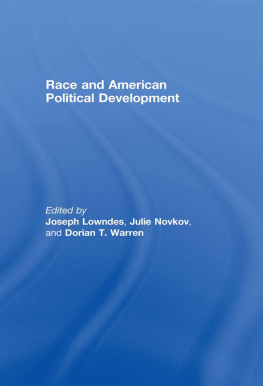Acknowledgments
At times, writing a history book seems a very solitary process. Yet, as I look back on the years of research, writing, and revision that went into this books creation, I am profoundly grateful for the assistance and encouragement I received from numerous friends, family members, colleagues, and trusted advisors. As a graduate student at Louisiana State University, I benefitted immensely from the expertise of my dissertation advisor, Andrew Burstein. He encouraged me when my research was headed toward new discoveries and reigned me in when it appeared that I was headed down tangential detours. He was always generous with his time; as mentors and friends go, he is one of the very best. Nancy Isenberg was similarly generous with her time and talents. A brilliant scholar, she lent her historical expertise and experience as an author to help me shape this project from its earliest stages. Michael Pasquier was also an extremely helpful guide, particularly in navigating the intersections of two related, but at times quite different, disciplines: history and religious studies.
In the Department of History at LSU, I discovered a vibrant academic community that proved an ideal setting in which to conduct the research that informs this book. Several faculty members went above and beyond their responsibilities to assist and encourage me, including Gaines Foster, Christine Kooi, Carolyn Herbst Lewis, Suzanne Marchand, Paul Paskoff, Charles Shindo, and Victor Stater. My fellow doctoral candidates in that department became invaluable colleagues and friends, particularly Geoffrey Cunningham, Terry Wagner, and Andrew Wegmann, as well as Jonathan Awtrey, Ashley Allen Baggett, Tom Barber, Nathan Buman, Chris Childers, Rebecca Bond Costa, Michael Frawley, Erin Halloran, Zach Isenhower, Andrew Johnson, Adam Pratt, Kat Sawyer Robinson, Michael Robinson, and Stu Tully.
At the Joseph Smith Papers Project, I have been able to further explore themes of religion and its impact on American political culture. Several of my colleagues there read part or all of this manuscript and offered meaningful feedback, including Mason Allred, Christopher Blythe, Matthew Godfrey, Matthew Grow, Reid Neilson, and Brent Rogers. In the wider world of academia, several other able historians read either part or all of the book manuscriptor provided feedback on portions I presented in academic settingsand saved me from several errors, including Thomas Bullock, Benjamin Carp, Matthew Dennis, Kevin Doyle, Sara Georgini, and Tara Strauch. Dick Holway and the capable editorial staff at the University of Virginia Press have been indispensable guides as I navigated the numerous steps involved in publishing a monograph. All the individuals I have mentioned above helped me make this book what it is today. However, the work is ultimately mine, and I alone am responsible for its content.
I presented aspects of this book at a variety of history conferences and in other academic settings. These presentations helped shape my thinking on the subject of religion and early American political culture in important ways. I will not list them all, but three occasions were particularly influential on the shape this project eventually took. A conference on national fasts and thanksgivings at Durham University in Durham, England, inspired me to think more deeply about the political ramifications of religious rites. The annual meetings of the Society for Historians of the Early American Republic provided ideal settings for scholars such as me to begin to engage with a wider academic audience. Lastly, I returned from a 2015 speaking engagement at the Kinder Institute on Constitutional Democracy with constructive feedback on how to further develop my understanding and explanation of the role clergymen played in the ratification debates of 178788.
Financial support for this project was provided in part through grants and fellowship from various institutions. The Department of History and Graduate School at LSU each offered generous funding for travel to archives and conferences throughout the country and overseas. The Department of Historys T. Harry Williams Dissertation Fellowship afforded me the time and resources necessary to complete the dissertation upon which this book is based. Additionally, an Andrew W. Mellon fellowship from the Virginia Historical Society resulted in key discoveries in its vast collections.
Lastly, but most importantly, I could not have written this book without the support and encouragement I received from my family. My parents, Monroe and Laurie McBride, raised me in a home that was full of books, as well as engaging conversation about the past and its significance to the present. Knowing that some parents express dismay when their children choose a major in the humanities, I consider myself very fortunate indeed to have parents who rejoiced when I told them I would major in history and pursue graduate degrees in the same. My parents-in-law, Kris and Gail Budinger, made no objections to their daughter marrying an erstwhile historian and have continually cheered me on in my academic endeavors. I thank my children, Erik, Laney, Joshua, and Thomas, who motivate me to be my best in a way that is difficult to articulate. Instead, I will simply state here that they never hesitated to play with me while I was writing this book, even if my mind was, at times, seemingly stuck in the eighteenth and nineteenth centuries. And then there is my wife, Lindsay. More than anybody else, this book exists because of this incredible woman. For reasons too numerous to list, I have dedicated this book to her.
Bibliography
Manuscript Collections
Albert and Shirley Small Special Collections Library, University of Virginia, Charlottesville
Joseph Carrington Cabel Papers
Carter Family Papers
Carter-Blackford Papers
William Davis Personal Narrative
Fitzhugh Family Collections
William Fogg Letters
David Griffith Papers
Reverend John Hurt Address
William Livingston Papers
James Monroe Papers
Thomas Nelson Letter
Papers Pertaining to the Lebanon Presbyterian Church
Edmund Pendleton Letter
American Antiquarian Society, Worcester, MA
Jesse Appleton Letters
Samuel Bixby Diary
Ashley Bowen Diary
Abner Brownell Diary
Asa Dunbar Diary
Thomas Fessenden Sermons
Nathan Fiske Papers
Justus Forward Diaries
Lampi Collection of American Electoral Returns, 17881825
Stephen Peabody Diaries
Jonathan Sayward Diaries
Digital Collections and Archives, Tufts University, Medford, MA
William Bentley Sermon Collection
Earl Gregg Swem Library Special Collections, College of William and Mary, Williamsburg, VA
Tucker Coleman Papers
Bishop James Madison Papers
John Page Memorandum Book
General Theological Seminary, New York City
Samuel Seabury Papers
Georgia Historical Society, Savannah
Historic Augusta Incorporated Revolutionary and Early Republic Era Manuscripts
Minutes of the Georgia Council of Safety
George Walton Letters and Biography
John J. Zubly Manuscripts and Letters, 17701781
Hargrett Special Collections and Rare Books, University of Georgia, Athens
Samuel Edward Butler Diary
William Manson Papers
Reverend John Newton Diary
Historical Society of Pennsylvania, Philadelphia
James Allen Diary
Henry Laurens Papers
Christopher Marshall Papers
Library Company of Philadelphia
Rush Family Papers
Library of Virginia, Richmond
Records of the General Assembly
Manuscript Division, Library of Congress, Washington, DC
Breckinridge Family Papers
Papers of the Continental Congress
Society for the Propagation of the Gospel in Foreign Parts Manuscripts
Next page

